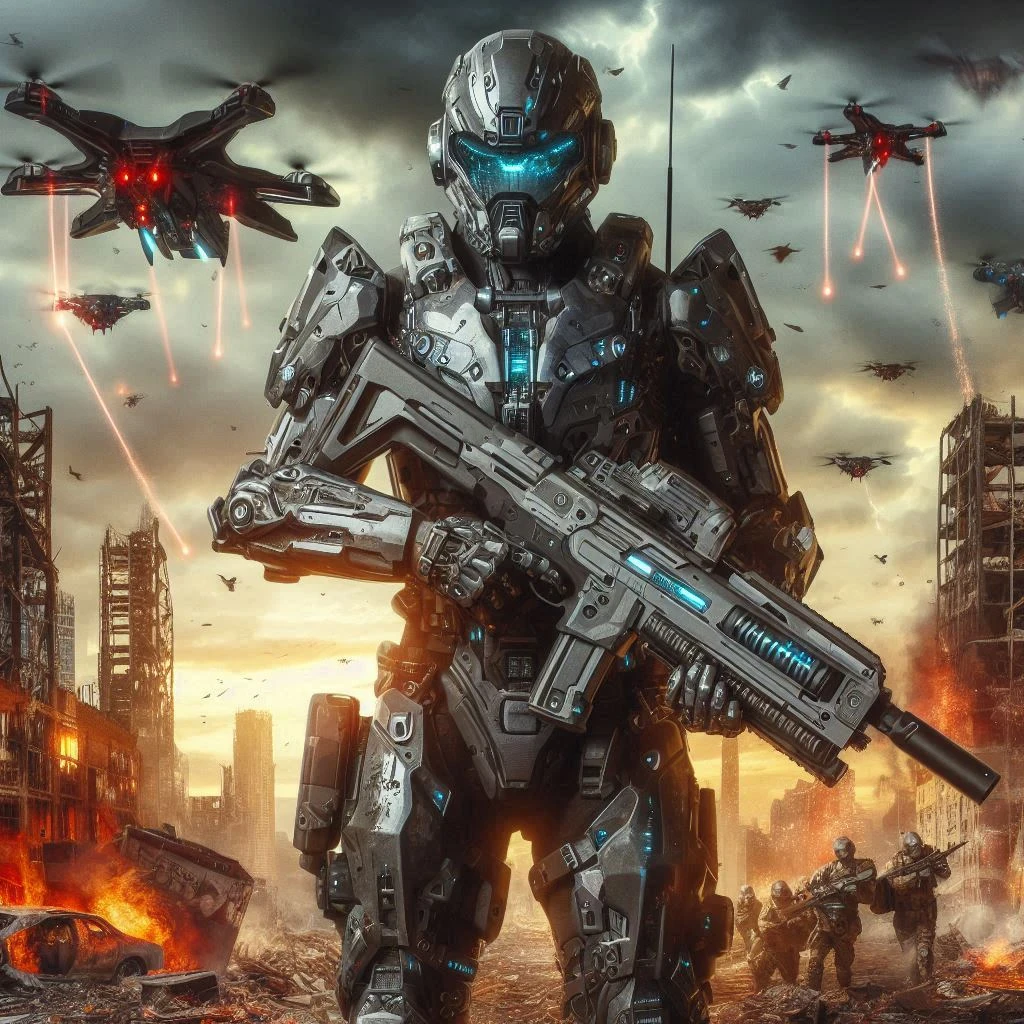
From World War II to Warzone: The Evolution and Impact of the Call of Duty Franchise

The Call of Duty franchise stands as one of the most successful and influential video game series in history. Since its inception, it has continually evolved, reflecting changes in both gaming technology and player preferences. What began as a World War II first-person shooter (FPS) has now expanded into modern warfare, futuristic combat, and even battle royale formats. Below is a detailed exploration of the Call of Duty series, from its early beginnings to its latest innovations, outlining how it has shaped the FPS genre.
1. Early World War II Era (2003-2006)
The Call of Duty series began with a focus on historical warfare, specifically the massive global conflict of World War II.
Call of Duty (2003): Developed by Infinity Ward, the original game offered a fresh take on the World War II shooter. It featured multiple perspectives, including American, British, and Soviet soldiers, allowing players to experience the war from different viewpoints. The game stood out for its cinematic storytelling and large-scale battles, becoming an instant hit and setting a new standard for FPS games.
Call of Duty: United Offensive (2004): This expansion for the original Call of Duty added new campaigns, vehicles, and multiplayer modes, building on the foundation of its predecessor. It extended the World War II narrative and provided players with new gameplay experiences, further solidifying the franchise's popularity.
Call of Duty 2 (2005): Marking a significant leap in terms of visuals and gameplay, Call of Duty 2 was praised for its realism and attention to detail. The game introduced regenerating health, which became a staple of the series, and refined the experience of large, chaotic combat.
Call of Duty 3 (2006): Treyarch's first full entry in the series kept the World War II setting but introduced vehicle combat for the first time. Though it didn't revolutionize the franchise, it still maintained the high standards expected from Call of Duty games, laying the groundwork for future installments.
2. Modern Warfare Revolution (2007-2011)
The Modern Warfare era marked a critical turning point for the series. Moving away from historical settings, these games focused on modern conflicts and introduced a more mature narrative tone.
Call of Duty 4: Modern Warfare (2007): This game was a groundbreaking moment, not just for the franchise, but for the FPS genre as a whole. Abandoning World War II for contemporary conflicts, Modern Warfare introduced highly detailed environments, modern weapons, and a compelling, politically charged story. Its multiplayer mode revolutionized the industry with a deep progression system, customization options, and a variety of game modes that kept players engaged for years.
Call of Duty: World at War (2008): Developed by Treyarch, this game revisited the World War II setting but offered a grittier, darker portrayal of the conflict. The standout feature was the introduction of the now-iconic "Nazi Zombies" mode, which allowed players to battle waves of undead enemies, creating a new co-op experience that became a major part of future Treyarch games.
Call of Duty: Modern Warfare 2 (2009): A direct sequel to the first Modern Warfare, this game expanded on everything that made the original successful. The campaign was more intense and controversial, featuring memorable missions like "No Russian." Multiplayer modes introduced new maps, killstreaks, and a "Spec Ops" mode, which offered a cooperative experience for players.
Call of Duty: Black Ops (2010): Set during the Cold War, Black Ops brought a deeper narrative, filled with espionage and conspiracy. Treyarch further refined their Zombies mode and introduced new multiplayer modes, ensuring its popularity across both casual and competitive players.
Call of Duty: Modern Warfare 3 (2011): Concluding the Modern Warfare trilogy, this game tied up the storyline of Captain Price and the battle against the ultra-nationalist forces. It refined many multiplayer elements, adding new game modes like "Kill Confirmed," and marked the end of an era for Modern Warfare.
3. Black Ops and Future Warfare (2012-2015)
With the massive success of the Modern Warfare series, the franchise shifted towards more futuristic and varied settings.
Call of Duty: Black Ops II (2012): A major step forward for the series, Black Ops II introduced a branching storyline, offering multiple endings based on player decisions. Set partially in a futuristic 2025, it added drones and other advanced technology to gameplay. Multiplayer also took a leap forward with the introduction of the "Pick 10" system, allowing more customization for player loadouts.
Call of Duty: Ghosts (2013): Developed by Infinity Ward, Ghosts introduced a new storyline set in a near-future, post-apocalyptic America. It also introduced the "Extinction" mode, a co-op mode where players fought against alien creatures, but the game received mixed reviews and wasn’t as groundbreaking as previous entries.
Call of Duty: Advanced Warfare (2014): This installment fully embraced futuristic combat, introducing exoskeleton suits that allowed for enhanced mobility and new mechanics like boosting and wall-running. Multiplayer focused heavily on these new movement capabilities, while the campaign featured advanced technologies and starred actor Kevin Spacey as the antagonist.
Call of Duty: Black Ops III (2015): Set in a dystopian future dominated by cybernetic enhancements, Black Ops III continued Treyarch's trend of creating intricate, cooperative campaigns. It also expanded the Zombies mode to include new narrative elements, deeper mechanics, and expanded co-op features.
4. Mixed Themes and Expansions (2016-2018)
During this period, Call of Duty experimented with a variety of settings, from space warfare to a return to historical roots.
Call of Duty: Infinite Warfare (2016): The most futuristic entry in the series, Infinite Warfare was set in space and featured spaceship combat alongside traditional FPS mechanics. While praised for its campaign and new "Zombies in Spaceland" mode, the multiplayer felt too similar to previous games, leading to mixed reception.
Call of Duty: Modern Warfare Remastered (2016): Released alongside Infinite Warfare, this was a remastered version of the original Modern Warfare, featuring enhanced graphics and gameplay. Fans appreciated the nostalgia and the high-quality improvements to the classic game.
Call of Duty: WWII (2017): A return to the franchise’s roots, WWII focused on the European theater of World War II. It removed many of the futuristic elements seen in recent games and offered a more grounded, historical experience. It was well-received, particularly for its authentic portrayal of the war.
Call of Duty: Black Ops 4 (2018): This game broke tradition by not including a single-player campaign. Instead, it introduced "Blackout," Call of Duty's first foray into the popular battle royale genre, which was met with great success. Zombies mode also returned, featuring expanded lore and gameplay.
5. Modern Warfare Reboot and Warzone Era (2019-Present)
The reboot of Modern Warfare brought the series full circle, while the introduction of Warzone propelled it into the battle royale scene.
Call of Duty: Modern Warfare (2019): A reboot of the beloved Modern Warfare subseries, this installment brought a grittier and more realistic tone. It modernized multiplayer with new mechanics and introduced Warzone, a free-to-play battle royale mode that quickly became one of the most popular in the world.
Call of Duty: Warzone (2020): A standalone battle royale experience, Warzone became a cultural phenomenon with its massive maps, 100-player battles, and ongoing updates. Its integration with other Call of Duty titles allowed for a seamless experience across different games.
Call of Duty: Black Ops Cold War (2020): Set during the 1980s Cold War, this game blended traditional Black Ops narrative elements with espionage and covert operations. It featured both a single-player campaign and a multiplayer component, alongside the Zombies mode.
Call of Duty: Vanguard (2021): Returning once again to World War II, Vanguard explored multiple global theaters of war, featuring iconic historical moments while remaining integrated with Warzone.
6. Recent and Future Releases (2022-Present)
Call of Duty: Modern Warfare II (2022): A direct sequel to the 2019 reboot, this game continued the gritty storytelling and tactical multiplayer gameplay that made the reboot a success.
Call of Duty: Warzone 2.0 (2022): A major update to Warzone, introducing new maps, mechanics, and deeper integration with Modern Warfare II.
Call of Duty: Modern Warfare III (2023): A continuation of the Modern Warfare storyline, this game promises further innovations and refinements to the formula.
Innovations and Impact
Over its nearly two-decade run, Call of Duty has not only set industry standards but also led the charge in innovating within the FPS genre. Key areas of impact include:
Multiplayer Customization and Progression: The series pioneered deep progression systems, loadout customization, and fast-paced, competitive multiplayer modes that have since become staples of FPS games.
Cinematic Campaigns: Call of Duty has consistently delivered Hollywood-style campaigns with strong narratives, immersive set pieces, and emotional depth.
Zombies Mode: What started as a side mode has become a full-fledged phenomenon, evolving with each installment to include richer lore and more complex gameplay mechanics.
Battle Royale: With Warzone, Call of Duty successfully entered the battle royale genre, competing with titans like Fortnite and PUBG, and establishing itself as a leader in the genre.
The Call of Duty series remains at the forefront of gaming, continually evolving while maintaining a strong connection to its roots. It has not only shaped the FPS genre but has also become a significant part of modern pop culture.
































